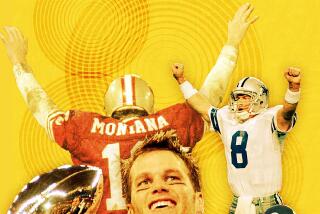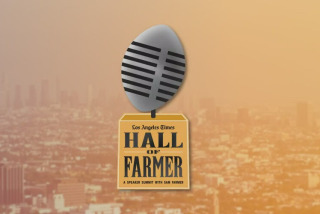Roethlisberger Turns Blue Collar Into Green
Hanging on the wall outside the Newport Beach office of agent Leigh Steinberg is a framed cartoon from the opinion pages of a Pittsburgh newspaper. It’s a drawing of the Steelers’ Ben Roethlisberger, King Kong-sized, standing shoulder to shoulder with the city’s skyscrapers. The caption reads “Roethlisburgh.”
In terms of marketability, the second-year quarterback looms every bit that large. Consider this: About 400,000 “Big Ben” T-shirts were sold last year, enough for every man, woman and child in Pittsburgh with more than 50,000 to spare. His was the best-selling NFL jersey last season, and it’s No. 2 this season and closing fast on the silver-and-black Randy Moss jerseys.
Less than a week after Roethlisberger made a game-saving, shoestring tackle in a divisional playoff game at Indianapolis, 40,000 of his new T-shirt -- “The Tackle” -- sold in a day. According to Steinberg, Roethlisberger’s signature sold for $20 last season and is now going for $110 -- rarefied air enjoyed by Dan Marino and no one else in football.
“Early on last season, a love affair was struck between Ben and Pittsburgh,” said Steinberg, who has represented several of the game’s best quarterbacks. “His blue-collar roots, his Midwest values meshed perfectly with that city.”
Blue collar has never been so green: Roethlisberger made $16.5 million in the past 12 months, including $4.5 million from endorsements. He has his own brand of barbecue sauce and beef jerky, and a few Pittsburgh greasy-spoon diners serve some variation of the “Roethlis-burger.”
What makes all this so amazing is not only how Roethlisberger got so big so fast, but how his Super Bowl counterpart, Seattle quarterback Matt Hasselbeck, a player with similar credentials, is anonymous by comparison.
Although he’s become more recognizable in the past two weeks, when the Seahawks advanced to their first Super Bowl with victories over Washington and Carolina, Hasselbeck has grown accustomed to cruising around cities -- even Seattle -- far under the radar.
“It’s just like being a normal citizen,” Hasselbeck said before last season. “The only thing I get is people who do a funny little double-take and say, ‘I feel like I know you from somewhere. Where’d you go to high school?’ That’s the extent of it.”
Even if the Seahawks win, at least one sports marketing expert believes Roethlisberger will still have the upper hand on Hasselbeck in terms of marketing opportunities.
“[Roethlisberger] has a tremendous upside win or lose,” said Steve Rosner, founding partner of 16W Marketing, the New Jersey-based agency that has represented Howie Long, Phil Simms, Cal Ripken Jr. and others. “He might earn over the next two years more money than Hasselbeck, even if Hasselbeck wins the Super Bowl. Winning is a little bit overrated. If you can have pizazz coming in and play for the right franchise....”
The thing is, Roethlisberger and Hasselbeck are talented, young quarterbacks who haven’t been required to shoulder the entire offensive load. While neither has Tom Brady’s leading-man looks, both are handsome enough to sell cars or detergent or any other product deals that come their way.
The difference, it seems, is where they play. Roethlisberger is a star for what Steinberg calls a “gateway franchise,” a club that’s as close to being America’s team as any other. Third-string Steelers are celebrities in Pittsburgh.
The Seahawks, meanwhile, are the NFL’s answer to the witness-protection program. They’re seldom on national TV, have much less of a coast-to-coast following, and even sensational running back Shaun Alexander, this season’s most valuable player, was on the cover of Sports Illustrated with the headline “Do you know his name?”
Football fans know his name now. And, the way Steinberg sees it, this Super Bowl likely will launch at least one player into the marketing stratosphere -- a place not even Roethlisberger has known.
“A vast celebrity-making machine exists in this country that will cross a player over,” he said, giving the example of Troy Aikman, whom he represented. Aikman’s big marketing breakthrough came when he led Dallas to a Super Bowl victory in January 1993.
“He walked onto that field at the Rose Bowl a very talented Dallas Cowboys quarterback,” Steinberg said. “When the game ended and he left the field as the winning MVP, he became Troy Aikman, household name in glittering lights.
“His life was altered forever.”
More to Read
Go beyond the scoreboard
Get the latest on L.A.'s teams in the daily Sports Report newsletter.
You may occasionally receive promotional content from the Los Angeles Times.











